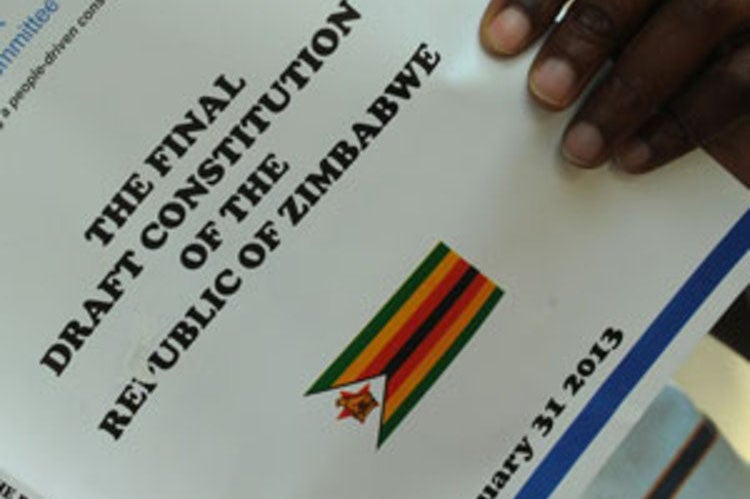Last week my article was entirely concerned with section 155 of the Constitution, clause 2 (a) which says the state has a duty to
(a) ensure that all eligible citizens.. . . . are registered as voters.
The rest of sub-section 2 continues outlining the State’s duties:
(b) ensure that every citizen who is eligible to vote in an election or referendum has an opportunity to cast a vote. and must facilitate voting by persons with disabilities or special needs:
Repeating that all citizens, whether they live in Unit K Chitungwiza or Unit K overseas and whether they are first-time voters or have voted in every election since 1980, must be helped to satisfy the requirements for registration. This clause is not obeyed by moving voters from the roll on which they registered to somewhere at the back end of Buhera. This trick is becoming more common. The first example I heard of was the late Professor George Kahari, who discovered in 2013 that his name was on the register somewhere near his ancestral home. Someone could have voted there using his name, when he registered in Mount Pleasant where he lived and still regularly visited his office at UZ till near his 90th year.
Note the emphasis on people with special needs; polling stations should be accessible for people in wheelchairs, for example, but people in wheelchairs, on crutches, with defective vision, or who cannot read should be left to decide for themselves who they want to help them vote. We are all aware of rural wards in this country, which claims the highest literacy rate in Africa, where headmen or their cronies vote on behalf of their people, all of whom, including teachers, have suddenly become unable make their own mark on a ballot paper.
(c) ensure that all political parties and candidate contesting an election or participating in a referendum have reasonable access to all material and information necessary for them to participate effectively:
That means that all candidates need access to up-to-date and accurate voters rolls in a usable form. In 2013 & 2018 this was not observed. For example, in 2018 the roll was only made available to the public, including opposition parties, on the Saturday before polling day, on CD in a format that did not allow the user to sort the lists by name or street address or age, all of which information was available to members of the looting party. It is left to historians to do what election observers are not allowed to do, like identifying the more than 14,000 people born on 1 January 1901 who voted in certain constituencies in 2013. The young lady who was 94 years old when she voted in 2013, but discovered in 2018, with the same name, address and ID number, that she was 19 in 2018 may be an extreme example, but plenty more voters shed 50, or 60 years between those two elections. Who used this ruse to vote in the names of, presumably, deceased voters? Nobody who might have objected was able to get the voters’ roll in usable form in time to stop this abuse.
(d) provide all political parties and candidates contesting an election or participating in a referendum with fair and equal access to electronic and print media, both public and private:
‘Fair and equal access’ means that major parties should each have the same number of hours for party political broadcasts on radio and TV, equal opportunity to advertise in the press and by posters. They should also be given equal coverage in the news pages. I say ‘major parties’ because when an election approaches, dozens of husband-and-wife parties spring up like mushrooms after rain and it would not be practical to give the same exposure to a party with 3 candidates and one with a candidate for every parliamentary seat in the country, or even every seat in several provinces. Maybe that is why so many of these mushrooms sprout – to create confusion. Tearing down posters is a practice not unknown in the best-run democracies, but those who commit this offence are known there to be idle and probably ignorant youth, and they are liable to be prosecuted if caught. Here one party is above the law.
‘Fair and equal access’ includes the right to campaign under the name by which it is known to the public. No other authority should be able to change a party’s name, though a new party should be required to submit their proposed name to an impartial authority who only has power to refuse names that are too similar to the name of an existing party.
It is clearly against the spirit of this clause for police to selectively limit access to opposition rallies while allowing a hundred extra buses to be used by another party. There may be no electronic or print media involved, but candidates’ access to the voters is being impeded.
and (e) ensure the timely resolution of electoral disputes.
This has been a dead letter since 2000, when the original MDC appealed against the published results in about 38 constituencies, if I remember correctly. By the end of the 5-year term of that parliament, only 12 of those cases had been heard in the courts, of which 6 were decided in favour of the MDC. If half the remaining cases had favoured them, they would have been the majority, even though the president had the power then to appoint 30 M.Ps. Justice delayed is justice denied . . . .
Post published in: Featured


